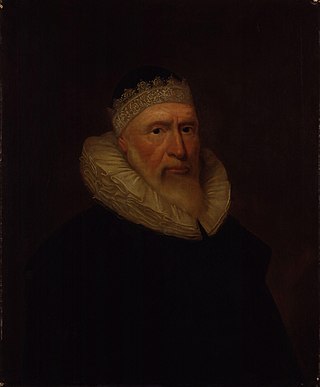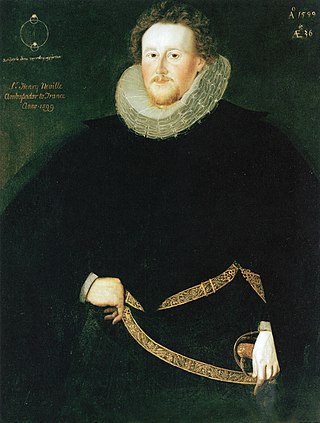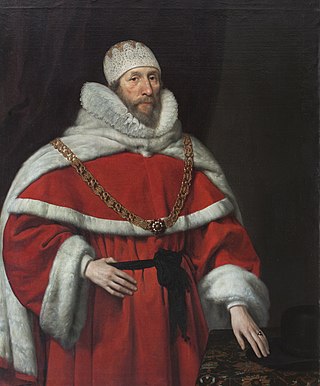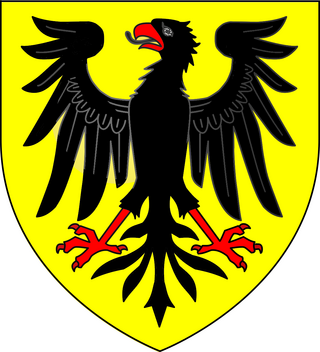Related Research Articles

Sir Julius Caesar was an English lawyer, judge and politician who sat in the House of Commons at various times between 1589 and 1622. He was also known as Julius Adelmare.

Sir Henry Savile was an English scholar and mathematician, Warden of Merton College, Oxford, and Provost of Eton. He endowed the Savilian chairs of Astronomy and of Geometry at Oxford University, and was one of the scholars who translated the New Testament from Greek into English. He was a Member of the Parliament of England for Bossiney in Cornwall in 1589, and Dunwich in Suffolk in 1593.

Sir Henry Neville was an English courtier, politician and diplomat, noted for his role as ambassador to France and his unsuccessful attempts to negotiate between James I of England and the Houses of Parliament. In 2005, Neville was put forward as a candidate for the authorship of Shakespeare's works.
Benedict Barnham was a London merchant, alderman and sheriff of London and MP.

Sir Francis Knollys, KG of Rotherfield Greys, Oxfordshire was an English courtier in the service of Henry VIII, Edward VI and Elizabeth I, and was a Member of Parliament for a number of constituencies.

Sir Henry Hobart, 1st Baronet, of Blickling Hall, was an English politician who succeeded Sir Edward Coke to become Chief Justice of the Court of Common Pleas.

Sir Thomas Temple, 1st Baronet was an English landowner and Member of Parliament.

Thomas Smythe or Smith of London, Ashford and Westenhanger, Kent was the collector of customs duties in London during the Tudor period, and a member of parliament for five English constituencies. His son and namesake, Sir Thomas Smythe, was the first governor of the East India Company, treasurer of the Virginia Company, and an active supporter of the Virginia colony.

Sir John Bennet was a judge and politician who sat in the House of Commons between 1597 and 1621. His career ended in controversy after he was found guilty of extorting bribes and excessive fees.
Sir William Bird was a lawyer, Member of Parliament for Oxford University and Dean of the Court of Arches but who was accused in Parliament of taking improper fees.
Sir Francis Fortescue, KB was an English politician.
Sir Anthony Lee was an English courtier and Member of Parliament, and the father of Elizabeth I's champion, Sir Henry Lee. He was at the court of Henry VIII in his youth, and served as a Justice of the Peace and Knight of the Shire for Buckinghamshire. He was a close friend of his brother-in-law, the poet Sir Thomas Wyatt.
Sir Thomas Smith (c.1556–1609), was the English master of requests.
Sir Peter Manwood (1571–1625) was an English politician who sat in the House of Commons at various times between 1589 and 1621.
Sir Hugh Beeston was an English politician who sat in the House of Commons at various times between 1589 and 1614.
Sir William Lygon (1568–1608) was an English politician who sat in the House of Commons at various times between 1589 and 1608.
Sir Herbert Croft was an English politician who sat in the House of Commons at various times between 1589 and 1614.
Gerbrand Harkes was a Dutch Protestant who became a bookseller and dealer in manuscripts in England.
Sir Archibald Napier was a Scottish landowner and official, master of the Scottish mint and seventh Laird of Merchiston.

Sir James Hales of The Dungeon in the parish of St. Mary Bredin, Canterbury, Kent, was a soldier who served as treasurer of the 1589 expedition to Portugal, a reprisal for the attack by the Spanish Armada on the English fleet the year before. He died as the expedition was about to return home to England and was buried at sea by his fully armed body being dropped feet first over the side of his ship. The scene is depicted in relief sculpture on his surviving mural monument in Canterbury Cathedral.
References
- Chambers, E.K. (1936). Sir Henry Lee; An Elizabethan Portrait. Oxford: Clarendon Press.
- Fernie, Ewan (2004). "Lee, Sir Henry (1533–1611)". Oxford Dictionary of National Biography (online ed.). Oxford University Press. doi:10.1093/ref:odnb/16288.(Subscription or UK public library membership required.)